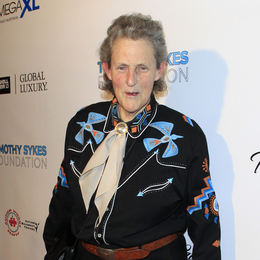
Temple’s Take
In Temple Grandin’s world, hope and perseverance make anything possible.
“Never say never” may very well be Temple Grandin’s unofficial motto.
Born in 1947, she grew up at a time when doctors recommended having children with autism and neurological disorders “banished to institutions.” Grandin’s mother, Eustacia Cutler, knew better. With rules, consequences, and therapy, and lots of ups and downs, they persevered.
Since then, Grandin has beaten all of the odds. She is a Ph.D., and a professor of animal science at Colorado State University, as well as a prolific author, a motivational speaker, and an autism expert. The remarkable 71-year-old has spoken to sold-out crowds in Philadelphia and around the world, and has written more than a dozen books—and she clearly has no intention of slowing down. In April, she spoke at the Pennsylvania Convention Center, as part of an all-day educational conference sponsored by Future Horizons.
Grandin was immortalized in Temple Grandin, an Emmy Award-winning HBO movie starring Claire Danes, which told the story of an autistic woman who overcome a male-dominated industry and became a leading authority on the humane handling of livestock. Her story underscores the fact that every individual, including those with autism, can make a profound difference in the world.
“Too many of these kids get a label of being overprotected and, unfortunately, they are just not carrying out the basic skills that they need to learn to go on and become productive adults,” Grandin says. “We’ve got to stretch these kids.”
Her message comes at a time when the need is great. One in 59 children has been diagnosed with autism spectrum disorder, according to recent figures from the U.S. Centers for Disease Control and Prevention. We spoke with Grandin about what she means by “stretching” kids with autism, the evolution of our understanding of the disorder, and why parents of autistic children should look to the future with a sense of hope.
Q&A
Is it easier for children with autism today than it was 10 or 15 years ago?
Yes, things have really improved for young children because there are a lot more services available for them. I recommend my book The Way I See It to help with the little ones.
You say these kids need to be “stretched.” What do you mean by that?
You don’t throw the kids into the deep end of the pool, but you’ve got to push them and help them stretch. So, you give your child two choices—and playing video games is not one of them.
What about the teens and adults?
That’s where I am seeing the problems, with the middle school and high school kids. I’m seeing the fully verbal kids who are not being challenged. They are addicted to video games. And they are holed up in the basement or the bedroom, and the parents can’t get them out of the house. You want to give them choices, but sitting in the bedroom all day is not going to be one of them. Even the kids who are more severely challenged can often do a lot more than we think that they can.
What do you consider a solution to this issue?
Let’s get them out and doing something active. When I was a teenager, I used to like to fly kites. I even made kites. It’s just simple stuff, like asking the neighbors if your son or daughter could walk their dogs every morning before and after school. Let’s get them outdoors and learning job skills outside the family.
You found what you loved with horses and cattle. You recommend others do the same, suggesting it may help children and maybe even turn it into a fulfilling career.
Exactly. I was exposed to cattle when I was 14 years old. If I was not exposed to cattle, I would not have gotten interested in them. We’ve got to get kids out and expose them to a wide variety of stuff—music, theater, wood shop, and more—so they can figure out what they might be interested in for their future.
Is there hope for everybody grappling with an autism diagnosis?
Definitely. You’ve got to start looking at what they can do. And even with some of the ones who are more challenged, there’s a tendency to overprotect them and to help them too much.
What is it like to talk to parents who get down about their children or their family because of the naysayers?
I’ve had parents tell me that doctors predicted that their son or daughter would “never amount to anything.” But they read my books and looked at my videos, and discovered that I was right. They did the hard work and they never gave up. They tell me, “My kid has graduated from college, has a good job, owns a house, and has a family now.” And it is very gratifying to hear this.


